Yves GARY Hits: 1531
Category: 1871 : CHALLENGE N°2
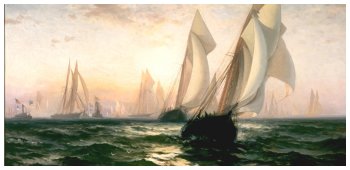 Another Victory for the American Yacht Columbia.
Another Victory for the American Yacht Columbia.Copyright © The New York Times: Published: October 19, 1871:
The second of the series of international contests for the possession of the Queen's Cup was sailed yesterday, and resulted in another victory for the American yacht Columbia.
As the race was to be over an open course starting from Sandy Hook Light-ship, it was necessary to make an early start, and consequently the Committee steamer William Fletcher left the foot of Desbrosses-street about 7:40 A. M. The Livonia, Dauntless and Palmer went out to the Horseshoe on Tuesday evening, stopped there all the night, and got under way for the Light-ship about 8:30 A. M. The Columbia left her anchorage off Quarantine, S. I., shortly after 5 A. M., and in company with the Dreadnaught, which was towed as far as the Quarantine Hospital, sailed slowly along in the direction of the Light-snip, propelled by a light breeze dead aft. There was considerable speculation during the morning as to which vessel would be selected by the Committee to represent the New-York Yacht Club. It was generally expected that if the weather should prove favorable the Dauntless would be given the honor. As the day advanced the breeze was still very light, and the water barely broken.
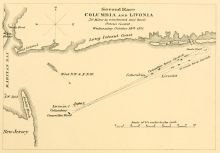 The Columbia arrived of the Light-ship about 10:40, and found the tug Lackawanna lying alongside, waiting for orders as to the direction in which she was to steam, in order to officiate as stake-boat. The Fletcher arrived shortly afterward, followed by the Dauntless, which looked in magnificent trim, and had up a very large foregaff-topsail, that set like a board. The Livonia and Palmer came up about fifteen minutes later, and in the meanwhile the Committee of five held a session in the Fletcher’s pilot-house. They were not very long in making their decision, and hailing the Columbia as she went by, bade her prepare to start. This announcement was received with decided surprise as the breeze had now freshened considerably, and was blowing a ten-knot hummer from the west north-west, quite sufficient to test the sailing qualities of any yacht, and as the Dauntless was in readiness everybody supposed she would go. The selection of the Columbia left the impression on the general public that with such a breeze they did not care to run any risks by selecting the Dauntless, and preferred falling back on the tried and reliable Columbia. As rear-Commodore OSGOOD was not prepared to go, he sent on board the Dauntless, and borrowed eight of their crew, as he was short-handed.
The Columbia arrived of the Light-ship about 10:40, and found the tug Lackawanna lying alongside, waiting for orders as to the direction in which she was to steam, in order to officiate as stake-boat. The Fletcher arrived shortly afterward, followed by the Dauntless, which looked in magnificent trim, and had up a very large foregaff-topsail, that set like a board. The Livonia and Palmer came up about fifteen minutes later, and in the meanwhile the Committee of five held a session in the Fletcher’s pilot-house. They were not very long in making their decision, and hailing the Columbia as she went by, bade her prepare to start. This announcement was received with decided surprise as the breeze had now freshened considerably, and was blowing a ten-knot hummer from the west north-west, quite sufficient to test the sailing qualities of any yacht, and as the Dauntless was in readiness everybody supposed she would go. The selection of the Columbia left the impression on the general public that with such a breeze they did not care to run any risks by selecting the Dauntless, and preferred falling back on the tried and reliable Columbia. As rear-Commodore OSGOOD was not prepared to go, he sent on board the Dauntless, and borrowed eight of their crew, as he was short-handed.
The stake-boat Lackawanna started about 10:45, in an east north-east course, to steam twenty miles, which would give the competing yachts a free run before the wind and a beat back. The steamer Magenta arrived about 11 A. M., 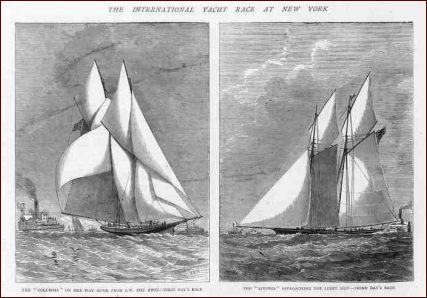 with a full cargo of passengers, to witness the race. About half an hour was lost before the Committee, at 11:52, lowered the flag on board the Fletcher as a signal to prepare, and five minutes afterward hoisted it and blew their whistle. As it was a flying start, the yachts had twenty minutes within which time to cross the line between the Committee-boat and the Light-ship. The Livonia was the first to pay off before the wind, and with mainsail, foresail, main and fore-gaff topsails, staysail, jib, flying jib and jib topsails set, bore away for the Light-ship. The Columbia followed about a couple of minutes later with the same canvass set. There was now a spanking breeze and every prospect of a glorious race.
with a full cargo of passengers, to witness the race. About half an hour was lost before the Committee, at 11:52, lowered the flag on board the Fletcher as a signal to prepare, and five minutes afterward hoisted it and blew their whistle. As it was a flying start, the yachts had twenty minutes within which time to cross the line between the Committee-boat and the Light-ship. The Livonia was the first to pay off before the wind, and with mainsail, foresail, main and fore-gaff topsails, staysail, jib, flying jib and jib topsails set, bore away for the Light-ship. The Columbia followed about a couple of minutes later with the same canvass set. There was now a spanking breeze and every prospect of a glorious race.
The yachts crossed the line between the Fletcher and the Light-ship as follows:

The course was east north-east. There was a good ten-knot breeze, and both boats, heeled gracefully over under the cloud of canvas they had stretched, dashing the spray from their bows, and leaving a long line of silvery foam in their wake, which was glistening bright in the rays of the morning sun. The Palmer and Dauntless followed on behind, with the Dreadnaught away to leeward, and the Tarolinta coming along behind on her starboard quarter. The Fletcher and Magenta followed at a respectful distance, and had hard work to keep up with these two flyers, which were making a good twelve knots an hour. 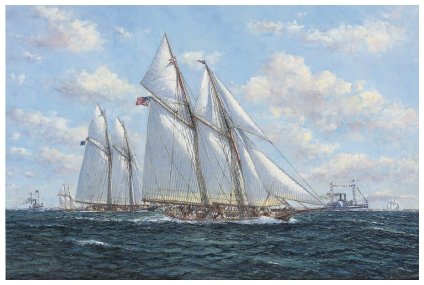 It was a beautiful sight to watch these two representatives of the nautical architecture of the greatest naval Powers in the world, each perfect in its respective model, and furnished with every equipment and invention that modern art has brought to light, cutting through the gently-rippling sea in their struggle for supremacy. On this point of sailing there was very little difference between the Columbia and the Livonia, and the most practical eye could hardly detect a gain for either vessel. The breeze still kept freshening and both vessels dashed through the water with remarkable velocity; in fact there has not been a better breeze to test the sailing qualities of a yacht this year. The outside division were keeping up pretty well, but the Palmer appeared to be getting the best of the Dauntless, who was about on a par with the Dreadnaught. About 12:30 both yachts were sailing remarkably fast, and they had as much wind as they could carry with their kites set, which was clearly demonstrated a few minutes after, when the staysail sheet of the Columbia parted with a report like the explosion of a pistol. All hands were alive in a moment, and down came the stay-sail on deck with a lively will, and the parted robe was soon taken out alone the main boom and reefed again. This slight accident, however, did not materially affect her speed, as the gaff-topsail drew considerably better now that it had no back wind from the staysail. The Commodore, however, was not satisfied, and soon sent the stay-sail up again.
It was a beautiful sight to watch these two representatives of the nautical architecture of the greatest naval Powers in the world, each perfect in its respective model, and furnished with every equipment and invention that modern art has brought to light, cutting through the gently-rippling sea in their struggle for supremacy. On this point of sailing there was very little difference between the Columbia and the Livonia, and the most practical eye could hardly detect a gain for either vessel. The breeze still kept freshening and both vessels dashed through the water with remarkable velocity; in fact there has not been a better breeze to test the sailing qualities of a yacht this year. The outside division were keeping up pretty well, but the Palmer appeared to be getting the best of the Dauntless, who was about on a par with the Dreadnaught. About 12:30 both yachts were sailing remarkably fast, and they had as much wind as they could carry with their kites set, which was clearly demonstrated a few minutes after, when the staysail sheet of the Columbia parted with a report like the explosion of a pistol. All hands were alive in a moment, and down came the stay-sail on deck with a lively will, and the parted robe was soon taken out alone the main boom and reefed again. This slight accident, however, did not materially affect her speed, as the gaff-topsail drew considerably better now that it had no back wind from the staysail. The Commodore, however, was not satisfied, and soon sent the stay-sail up again.
Shortly afterward the stake-boat came in sight, and the two yachts changed position as the Columbia ran down a little to leeward to the Livonia, which held to her original course. The breeze had now got very fresh, and, as they were coming up to the stake-boat, the Columbia took in her staysail, a manoeuvre which the Livonia soon followed. Following up behind, the Palmer was doing very well, and the Dreadnaught and Dauntless were luffing up every now and then, as if they had as much wind as was good for them. At 1:15 the Columbia took in her balloon-Jib and set her working-jib. As both the yachts came up toward the stake-boat it became apparent how close a race it was, although the Columbia had certainly gained over a minute on the run down.
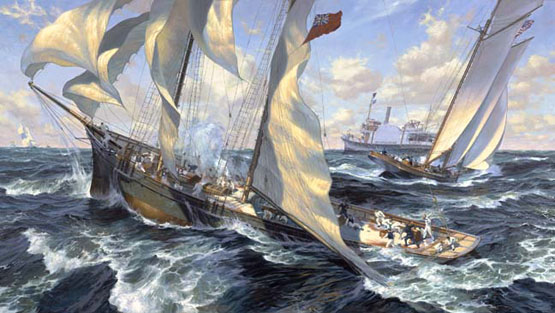 The two yachts rounded as follows:
The two yachts rounded as follows:

It was a magnificent sight as they both came round the stake-boat. The Livonia was first at 1:20, and jibed her main boom, while the Columbia came shooting in between her and the stake-boat at 1:21:40, and tacking, took the windward position. As she came round all hands worked lively and down came the big fore gaff-topsail and flying jib. A few minutes afterward they took in the large main-topsail. The race had now become very interesting, and it was certainly a fair trial of the respective sailing qualities of both vessels, as they could not have a better breeze. There was just as much as they could manage with four sails. The Livonia still kept her topsails set, but took in her flying-jib. When the Columbia had got well down to her work, it soon became apparent that, by the wind, the Englishman had not the slightest chance, as the former was both head reaching and out-pointing her. The Livonia, finding the breeze still freshening, took in her big jib and set a smaller one. The Dauntless, Dreadnaught and Palmer turned round and followed after the contestants, with the evident intention of trying what they could go by the wind with the Englishman. The Dauntless got into trouble taking in some of her kites, and started for home. The Palmer was doing pretty well, followed by the Dreadnaught, who was also sailing remarkably well, and proving herself a yacht of no ordinary caliber.
About 2 P. M. the Columbia was about half a mile off the weather-bow of the Livonia, and the breeze was rapidly increasing. At 2:04 the Columbia took in her flying-jig, and only just in time, as a minute later it began to blow in earnest, but as the squall struck her she stood it nobly, and stood up as stiff as a three-decker. When it caught the Livonia she behaved well, but as she found it increasing, she took in her maintop-sail and left all others standing. The outside division now began to take in their kites, and the Dreadnaught stowing her flying jib, the Palmer followed suit by taking in both her topsails. By this time it was blowing a regular topgallant-sail breeze, and the Englishman was certainly doing remarkably well. As the breeze freshened the sea also came up and the white caps danced merrily over the surface of the water, but notwithstanding the forebodings of would-be yachting savants, the Columbia did not labor, and proved herself to be the best yacht afloat. Her antagonist was in no wise to be despised, and the fresher it blew the better she proved herself. The Columbia, finding the gale still increasing, and having a good lead, choose to run no risks, and took in her foresail, leaving her under-jib and mainsail. Under this canvas, however, with the main-sheet slackened out a few feet she was hamming along at about the rate of fourteen knots an hour. The Palmer was still doing very fairly and closing up with the Livonia, and the Dreadnaught was sticking in her weather quarter. The gale was still freshening, and every now and then the yachts would bow their heads and luff up to receive the blasts of rude Boreas with meek submission. Henceforward let no man say the Columbia is not a heavy weather boat.
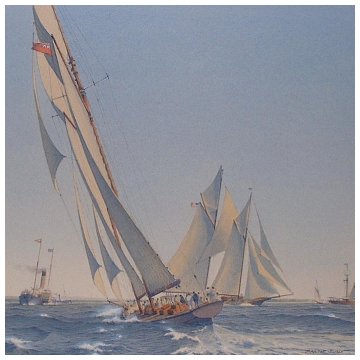 At 2:11, the Livonia split her jib, and taking in the fragments, set a smaller one, but stuck to her foretopsail with determined pertinacity. The Palmer began to find the breeze a little too fresh for her general welfare, and taking in her foresail, began to point toward XXX. The Dreadnaught was still carrying on a good deal of canvas, but would every now and then bow her head to the force of the elements. About 2:22 the wind still freshening, and the Livonia sailing very well and satisfactorily enunciating the problem about the weatherly boats they build on the other side. The Columbia let out a little main-sheet, and still kept a steady lead, although the Englishman hung about a quarter of a mile of her quarter, as she was glued there. The Light-Ship was still out of sight, and in order to keep well up to windward the Columbia took in the slack or her main-sheet and set a single-reefed fore-sail. The extra canvas soon began to demonstrate its value, and barring accidents, Britannia was fairly beaten. At 2:33 the Columbia sighted we Light-ship about three points on her lee bow, and immediately slacking off all her sheets, let her have it. She behaved well and stood up to the gale nobly, but rushed through the water at a terrific pace, shutting out all remaining of this race for the Livonia. The Dreadnaught meanwhile hauled up on the wind and started on a homeward journey, but not before she had proved herself, in the eyes of all yachtsmen, to be one of the best vessels sailing under the New-York Yacht Club colors. Now that they had altered their course and were running a couple of points free, they set their flying-jib on board the Columbia, which helped to lift her over the rapidly-increasing waves. The steamer Magenta, well laden with excursionists, was still accompanying the yachts, and her Captain certainly have his guests an excellent view of the finest race this season, without getting in the way of the competing vessels. Now that the body of the Light-ship loomed fairly up on the horizon, and the race was drawing to a close, the excitement advanced to fever heat, and, finding the Livonia still hung on her old position, they gave the Columbia all she could take, and this representative vessel proved that she could stand wind and sea as well as any boat afloat. Both the yachts still kept on their race for victory, and the elements lent their aid. Each moment only lessened the hopes of the Livonia, and when at last the Columbia shot across the line between the Fletcher and the Light-ship, the winner of one of- the greatest yacht races on record, the enthusiasm which burst forth from the spectators and saluted the victor was gallantly re-echoed when the noble antagonist shot by some three minutes later. The victory was nobly won.
At 2:11, the Livonia split her jib, and taking in the fragments, set a smaller one, but stuck to her foretopsail with determined pertinacity. The Palmer began to find the breeze a little too fresh for her general welfare, and taking in her foresail, began to point toward XXX. The Dreadnaught was still carrying on a good deal of canvas, but would every now and then bow her head to the force of the elements. About 2:22 the wind still freshening, and the Livonia sailing very well and satisfactorily enunciating the problem about the weatherly boats they build on the other side. The Columbia let out a little main-sheet, and still kept a steady lead, although the Englishman hung about a quarter of a mile of her quarter, as she was glued there. The Light-Ship was still out of sight, and in order to keep well up to windward the Columbia took in the slack or her main-sheet and set a single-reefed fore-sail. The extra canvas soon began to demonstrate its value, and barring accidents, Britannia was fairly beaten. At 2:33 the Columbia sighted we Light-ship about three points on her lee bow, and immediately slacking off all her sheets, let her have it. She behaved well and stood up to the gale nobly, but rushed through the water at a terrific pace, shutting out all remaining of this race for the Livonia. The Dreadnaught meanwhile hauled up on the wind and started on a homeward journey, but not before she had proved herself, in the eyes of all yachtsmen, to be one of the best vessels sailing under the New-York Yacht Club colors. Now that they had altered their course and were running a couple of points free, they set their flying-jib on board the Columbia, which helped to lift her over the rapidly-increasing waves. The steamer Magenta, well laden with excursionists, was still accompanying the yachts, and her Captain certainly have his guests an excellent view of the finest race this season, without getting in the way of the competing vessels. Now that the body of the Light-ship loomed fairly up on the horizon, and the race was drawing to a close, the excitement advanced to fever heat, and, finding the Livonia still hung on her old position, they gave the Columbia all she could take, and this representative vessel proved that she could stand wind and sea as well as any boat afloat. Both the yachts still kept on their race for victory, and the elements lent their aid. Each moment only lessened the hopes of the Livonia, and when at last the Columbia shot across the line between the Fletcher and the Light-ship, the winner of one of- the greatest yacht races on record, the enthusiasm which burst forth from the spectators and saluted the victor was gallantly re-echoed when the noble antagonist shot by some three minutes later. The victory was nobly won.
The official time of the contesting yachts was as follows:

Making the Columbia win by about eight minutes with time allowance. The yachts had a hard time coming home, as it blew a gale or wind right in their teeth. The third race will be sailed to-morrow over the New-York course.

THE INTERNATIONAL YACHT RACES - Hunt's Yachting Magazine Dec. 1871 - Google Livres
THE YACHT RACE. - Another Victory for the American Yacht Columbia. The Livonia Defeated on the Open Course-- Forty Miles in Three Hours--The Quickest Race on Record. - Article - NYTimes.com
